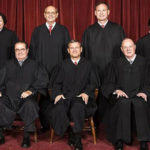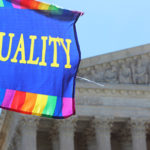In a landmark decision, the U.S. Supreme Court ruled 5-4 the Constitution does not allow the government to deny same-sex couples marital benefits available to married couples of the opposite sex.
The decision to legalize same-sex marriage nationwide prompted sharp response from a wide range of Baptists—concern from those who support a traditional view of marriage as “holy union between one man and one woman” and celebration from self-described “welcoming and affirming” Christians.
 Holly HollmanWriting for the majority, Justice Anthony Kennedy stated: “The court now holds that same-sex couples may exercise the fundamental right to marry. No longer may this liberty be denied to them.”
Holly HollmanWriting for the majority, Justice Anthony Kennedy stated: “The court now holds that same-sex couples may exercise the fundamental right to marry. No longer may this liberty be denied to them.”
In an initial assessment of the decision, Holly Hollman, general counsel for the Baptist Joint Committee for Religious Liberty, noted the court’s majority “respectfully acknowledges that some deeply held and long-standing religious beliefs oppose same-sex marriage.”
“In doing so, I believe Justice Kennedy was trying to quell fears that religious beliefs at odds with the court’s view of same-sex marriage are beyond the pale of civil discourse,” Hollman said. “In heated public debates over marriage equality, religious beliefs have not always been treated so respectfully.
“Of course, this decision does not answer all the questions about the conflicts between religious institutions and legal rights of same-sex couples. It does, however, acknowledge that marriage has both religious and civil meanings. Respect for religious differences will be a key component of working out the various conflicts that will arise in the wake of this decision. The court today, however, was properly focused on the civil definition of marriage.”
Texas Attorney General Ken Paxton called the court’s decision a “flawed ruling” and “a radical departure from countless generations of societal law and tradition.” He pledged to protect citizens’ rights “to exercise their faith in their daily lives without infringement and harassment.”
 Texas Attorney General Ken Paxton“Consistent with existing federal and state Religious Freedom Restoration Acts that should already protect religious liberty and prevent discrimination based on religion, we must work to ensure that the guarantees of the First Amendment, protecting freedom of religion, and its corollary freedom of conscience, are secure for all Americans,” he said.
Texas Attorney General Ken Paxton“Consistent with existing federal and state Religious Freedom Restoration Acts that should already protect religious liberty and prevent discrimination based on religion, we must work to ensure that the guarantees of the First Amendment, protecting freedom of religion, and its corollary freedom of conscience, are secure for all Americans,” he said.
“Our guiding principle should be to protect people who want to live, work and raise their families in accordance with their religious faith. We should ensure that people and businesses are not discriminated against by state and local governments based on a person’s religious beliefs, including discrimination against people of faith in the distribution of grants, licenses, certification or accreditation; we should prevent harassing lawsuits against people of faith, their businesses and religious organizations; we should protect nonprofits and churches from state and local taxes if the federal government penalizes them by removing their 501(c)(3) status; and we should protect religious adoption and foster care organizations and the children and families they serve.”
Sign up for our weekly edition and get all our headlines in your inbox on Thursdays
 Jim DenisonJim Denison, founding president of the Denison Forum on Truth and Culture, compared the court’s decision to the 1973 Roe v. Wade ruling that legalized abortion.
Jim DenisonJim Denison, founding president of the Denison Forum on Truth and Culture, compared the court’s decision to the 1973 Roe v. Wade ruling that legalized abortion.
“Now the court has sided again with an activist agenda rather than historic moral commitments,” said Denison, former pastor of Park Cities Baptist Church in Dallas and theologian-in-residence with the Baptist General Convention of Texas.
“This decision renders marriage genderless and makes it primarily about the desires of adults rather than the welfare of children, families and society.”
Denison raised questions about what the ruling will mean for churches, Christian institutions and individual believers who conscientiously oppose same-sex unions.
“Most legal observers believe that pastors and churches will not be forced to perform same-sex marriages. But what about a church facility rented for weddings?” he asked. “What about universities that offer married heterosexual students housing but not married gay and lesbian students? What about hiring practices and spousal benefits at faith-based hospitals and ministries? Will statements defending biblical marriage be considered hate speech? Will religious nonprofits that support biblical marriage see their tax-exempt status threatened?
“The ruling is fresh, the questions are many, and the answers are few.”
 Russell MooreRussell Moore, head of the Ethics and Religious Liberty Commission of the Southern Baptist Convention, predicted the ruling “will have wide-ranging and perilous consequences for the stability of families and for freedom of religion.”
Russell MooreRussell Moore, head of the Ethics and Religious Liberty Commission of the Southern Baptist Convention, predicted the ruling “will have wide-ranging and perilous consequences for the stability of families and for freedom of religion.”
“Despite this ruling, the church of Jesus Christ will stand fast,” Moore said. “We will not capitulate on this issue because we cannot. To minimize or ignore a Christian sexual ethic is to abandon the message Jesus handed down to us, and we have no authority to do this.”
In contrast, the Association of Welcoming and Affirming Baptists called the Supreme Court ruling “a significant milestone for the LGBTQ (lesbian/ gay/ bisexual/ transgender/ queer) community.”
“Among core Baptist beliefs is the separation of church and state,” the association said. “In the secular arena, the Supreme Court’s ruling clearly recognizes the equality of marriage for all people completely independent of our or other Baptists’ religious beliefs.
“In the face of anti-equality rhetoric among part of the broader Baptist family, AWAB calls specifically on the Southern Baptist Convention to encourage civil compliance with equality law among their membership, regardless of whether individual churches choose to conduct or theologically acknowledge same-sex unions.”
 Gus ReyesGus Reyes, director of the Christian Life Commission, the public policy and moral concerns agency of the BGCT, emphasized marriage as a divinely ordained “holy union between one man and one woman,” not subject to redefinition by any court.
Gus ReyesGus Reyes, director of the Christian Life Commission, the public policy and moral concerns agency of the BGCT, emphasized marriage as a divinely ordained “holy union between one man and one woman,” not subject to redefinition by any court.
“We respect the Supreme Court decision as the law of the land, but we believe in One who is higher than national laws, and ultimately, we must submit to God’s authority,” Reyes said. “Marriage is a God-designed and God-ordained institution, and no Supreme Court decision can redefine what has been defined by God.”
In light of the ruling, Reyes suggested Texas Baptist churches consider taking several steps.
“First, we recommend churches adopt bylaws and employment policies that clearly define biblical marriage and protect church property from use in same-sex ceremonies. The CLC offers examples of how this may be done, which can be found on our website,” he said.
 David Hardage“Additionally, ministers who do not agree with the state’s understanding of marriage may wish to refrain from signing state marriage licenses and move to offering a covenant marriage consistent with biblical teaching.”
David Hardage“Additionally, ministers who do not agree with the state’s understanding of marriage may wish to refrain from signing state marriage licenses and move to offering a covenant marriage consistent with biblical teaching.”
David Hardage, executive director of the BGCT Executive Board, underscored Texas Baptists’ desire to share God’s love and “treat all people with grace and respect,” but he affirmed a traditional understanding of what the Bible teaches about marriage.
“Texas Baptists believe the love of God, demonstrated by the death of his Son on the cross, was for all people. We are committed to loving and caring for all our neighbors,” Hardage said.
“At the same time, we strongly affirm the biblical view of marriage as that between one man and one woman. This has been, is and will be our position on this matter.”
 Jeff HoodJeff Hood, an LGBT activist in the Dallas area and 2009 graduate of Southern Baptist Theological Seminary in Louisville, Ky., likewise emphasized God’s love, but he took an altogether different view on the subject of same-sex marriage.
Jeff HoodJeff Hood, an LGBT activist in the Dallas area and 2009 graduate of Southern Baptist Theological Seminary in Louisville, Ky., likewise emphasized God’s love, but he took an altogether different view on the subject of same-sex marriage.
“God is love. When love wins, God wins,” said Hood, minister of social justice with Hope for Peace and Justice. “I am thankful that the Supreme Court stood with God this morning, and I pray that Texas Baptists will do the same.”
In 1996, messengers to the BGCT annual meeting approved a report stating the Bible teaches “the ideal for sexual behavior is the marital union between husband and wife and that all other sexual relations—whether premarital, extramarital or homosexual—are contrary to God’s purpose and thus sinful.” Texas Baptists subsequently reaffirmed that statement—most recently in 2007.
When two churches—University Baptist Church in Austin and Royal Lane Baptist Church in Dallas—publicly acted contrary to that position, the BGCT Executive Board took action by refusing any further contributions from the congregations and asking the churches to cease identifying themselves as affiliated with the BGCT.
 Suzii PaynterThe Cooperative Baptist Fellowship issued a statement calling for unity in the wake of the ruling. CBF Executive Coordinator Suzii Paynter noted the ruling accentuates the diversity of the nation.
Suzii PaynterThe Cooperative Baptist Fellowship issued a statement calling for unity in the wake of the ruling. CBF Executive Coordinator Suzii Paynter noted the ruling accentuates the diversity of the nation.
“People of faith woven into our nation’s vibrant religious tapestry fall along many points on the spectrum on the subject of same-sex marriage,” Paynter said. “In the High Court’s ruling today, that is borne out in both the majority opinion and in dissenting opinions referencing religious groups.”
With additional reporting by Bob Allen of Baptist News Global














We seek to connect God’s story and God’s people around the world. To learn more about God’s story, click here.
Send comments and feedback to Eric Black, our editor. For comments to be published, please specify “letter to the editor.” Maximum length for publication is 300 words.